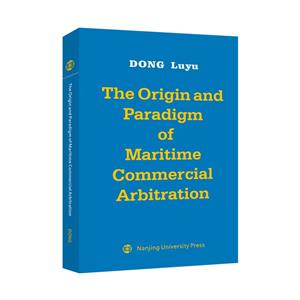扫一扫
关注中图网
官方微博
本类五星书更多>
-
>
法律的悖论(签章版)
-
>
DD罗翔作品集 法治的细节+圆圈正义(全2册)
-
>
中华人民共和国劳动法
-
>
中国思想史十讲(上卷)
-
>
私人财富保护、传承与工具
-
>
再审洞穴奇案
-
>
法医追凶:破译犯罪现场的156个冷知识
涉海商事仲裁的缘起及其法律结构 版权信息
- ISBN:9787305257629
- 条形码:9787305257629 ; 978-7-305-25762-9
- 装帧:一般胶版纸
- 册数:暂无
- 重量:暂无
- 所属分类:>
涉海商事仲裁的缘起及其法律结构 内容简介
在国际海上货物运输中,货物运输的纠纷解决往往参照海运提单中的仲裁援引条款。虽然这一做法已成为商业习惯而被广泛应用,但从法理上这类援引条款的效力仍饱受质疑。本书从海运提单的法律性质出发,阐明海运提单与仲裁条款的关系,论证海运提单中仲裁条款的一般效力,建立仲裁条款对第三方持单人的约束力,为仲裁条款援引入海运提单打通了路径,提高了海运纠纷解决途径及结果的可预期性和稳定性。同时,通过对中英两国法律及大量案例的梳理分析,解析两国法律的共性与特性,本书的研究致力于为我国出海企业提示相关法律风险,为对外贸易保驾护航。
涉海商事仲裁的缘起及其法律结构 目录
Preface
Introduction
Chapter 1 Setting the Scene of Incorporating an Arbitration Clause from a Charterparty to a Bill of Lading in Chinese Legal System
1.1 Introduction
1.2 Maritime Arbitration in China
1.3 Problems in Chinese Legal System Concerning the Incorporation of an Arbitration Clause from a Charterparty to a Bill of lading
Chapter 2 Functions and Legal Nature of Bills of Lading
2.1 Introduction
2.2 Custom of Merchants
2.3 The Register Book
2.3.1 The Clerk—Officer in Charge of the Register Book
2.3.2 The Contract of Carriage Recorded in the Register Book
2.4 Copies of the Register Book and Rudimentary Forms of Bills of Lading
2.5 The Book and/or the Bill of Lading
2.6 Bills of Lading as Transferrable Documents
2.6.1 Before the Bill's Transferability BeingRecognised in English Law
2.6.2 The Leading Case Lickbarrow v Mason
2.7 The Legal Nature of Bills of Lading Under the Bills of Lading Act 1855
2.8 The Legal Nature of Bills of Lading Under the Carriage of Goods by Sea Act 1992
2.9 Conclusion
Chapter 3 Traditional Legal Basis for Extending the Referred Arbitration Clause to a Holder of a Bill of Lading
3.1 Introduction
3.2 Assignment
3.2.1 The Charterparty's Arbitration Clause is Not Assigned to the Holder of a Bill ofLading
3.2.2 A Holder's Consent to the Assignment of an Obligation to Arbitration is Absent
3.2.3 An Arbitration Clause Would Be Unassignable if it is Proved as a Personal Performance
3.3 Incorporation by Reference
3.3.1 The Conflicting Judgments About Interpreting the Bill's Incorporation Clause
3.3.2 The Non-Contractual Effect Bill's Incorporation Clause Hinders the Application of the Principle of Incorporation
3.4 Third-Party Beneficiary
3.5 Conclusion
Chapter 4 The New Paradigm for the Incorporation of an Arbitration Clause from a Charterparty to a Bill of Lading (Part 1)
4.1 An Overview of the New Paradigm
4.2 The New Paradigm Part I: When the Holder of a Bill of Lading Does Not Have Access to the Referred Arbitration Clause
4.3 Establishing an Independent Contractual Effect of the Bill's Incorporation Clause
4.3.1 The Practical Necessity to Regard an Incorporation Clause as a Separate Contract
4.3.2 Theoretical Support: The Principle of Separability
4.4 Parties' Consent to Arbitrate and its Legal Effecton an Incorporation
4.4.1 The Consent from a Shipowner
4.4.2 The Consent from the Holder of a Bill of Lading
4.5 The Consistency Test
4.5.1 When the Wording of the Referred Arbitration Clause Incurs Inconsistency
4.5.2 No Arbitration Clause Exists in the Referred Charterparty
4.6 The Case The Channel Ranger
4.7 The New Paradigm Part I: When the Holder of a Bill of Lading is a Third-party to the Related Charterparty
Chapter 5 The New Paradigm Part II: When the Holder of aBill of Lading Has Access to the Referred Arbitration Clause
5.1 The Legal Effect of the Bill's Incorporation Clause
5.1.1 When the Holder of a Bill of Lading is an Original Party to the Referred Arbitration Clause
5.1.2 When the Related Charterparty is on aStandard Form
5.1.3 hen a Bill of Lading is on a Standard Form
5.2 The Consistency Test
5.2.1 When the Holder of a Bill of Lading is an Original Party to the Referred Arbitration
5.2.2 When a Standard Arbitration Clause Conflicts with a Bill's Incorporation Clause or When a Standard Incorporation Clause Conflicts with the Referred Arbitration Clause
5.3 The New Paradigm Part II: When One-Contract Doctrine Applied
Chapter 6 The Workability of the New Paradigm: Setting the Scene in Chinese Legal System
6.1 Applying the New Paradigm to Chinese Law
6.2 Step 1: The Incorporation Clause-An Evidential Document between the Charterer and the Carrier
6.3 Step 2: The Incorporation Clause-An Independent Contract between the Shipper and the Carrier
6.3.1 The Independent Legal Status of an Incorporation Clause
6.3.2 A Valid Incorporation Clause between the Shipper and the Carrier
6.4 Step 3: The Transfer of an Incorporation Clause-An Independent Contract between the Holder of aBill of Lading and the Carrier
6.4.1 Theoretical Support
6.4.2 The Judicial Trend in China
6.5 Challenges: A Strict Interpretation of 'an Agreement in Writing
6.5.1 A Different Treatment to Clauses on the Face and the Reverse
6.5.2 A Strict Rule of Locating the Referred Charterparty
6.5.3 Distinct Requirements in Substantive Validity: Nominating an Existing Arbitration Commission is a Necessity to a Valid Arbitration Clause
6.6 Conclusion
Chapter 7 The Findings: A New Paradigm
Bibliography
展开全部
涉海商事仲裁的缘起及其法律结构 作者简介
董璐宇,东南大学法学院博士后,英国埃克塞特大学法学博士。
书友推荐
- >
巴金-再思录
巴金-再思录
¥14.7¥46.0 - >
经典常谈
经典常谈
¥12.7¥39.8 - >
史学评论
史学评论
¥13.4¥42.0 - >
名家带你读鲁迅:故事新编
名家带你读鲁迅:故事新编
¥13.0¥26.0 - >
罗曼·罗兰读书随笔-精装
罗曼·罗兰读书随笔-精装
¥20.3¥58.0 - >
二体千字文
二体千字文
¥14.0¥40.0 - >
朝闻道
朝闻道
¥8.8¥23.8 - >
莉莉和章鱼
莉莉和章鱼
¥21.0¥42.0
本类畅销
-
国富论:“现代经济学之父”亚当·斯密的传世名作
¥13.4¥38 -
中国法律思想史
¥20.5¥25 -
法律的悖论(签章版)
¥34.9¥49.8 -
法治在中国-制度.话语与实践-(修订版)
¥24.4¥32 -
批判法学-一个自由主义的批评
¥8.8¥20 -
法律的悖论
¥35.9¥49.8





















